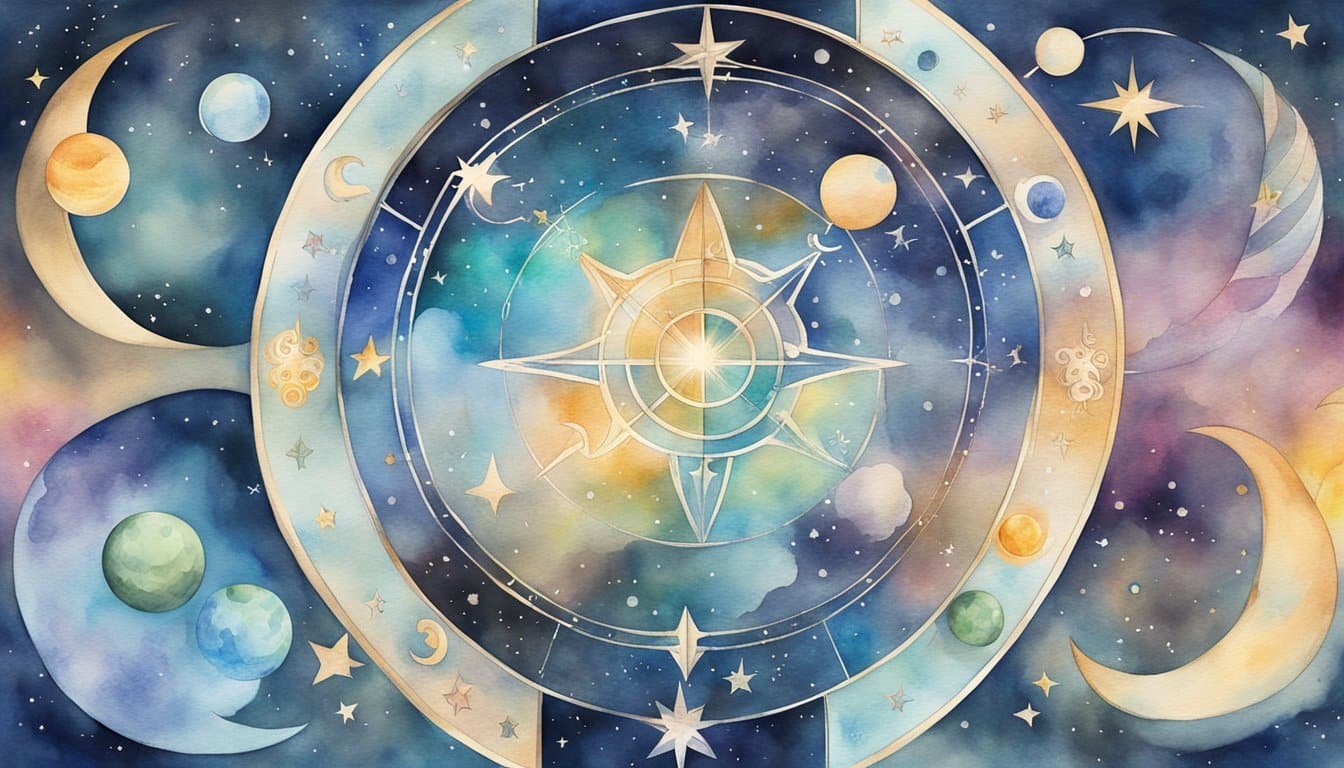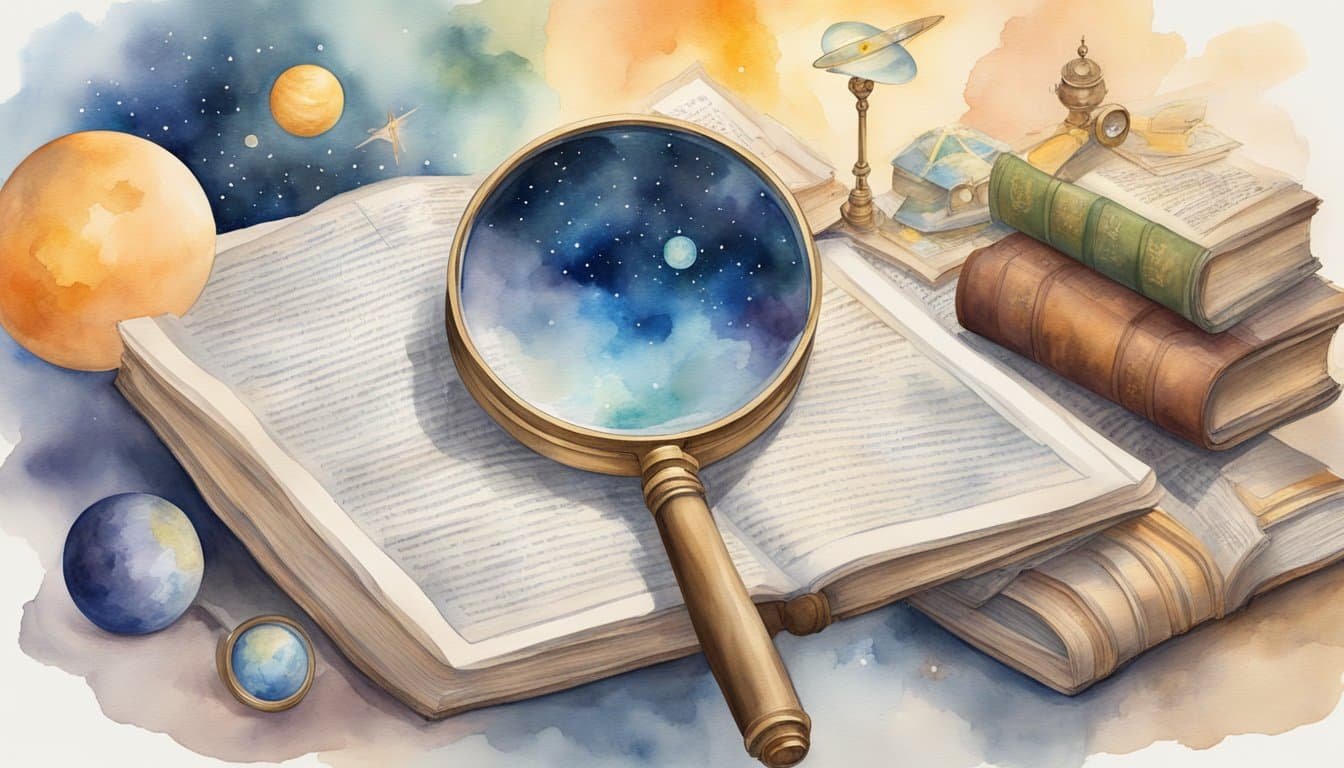Astrology and Its Foundations
Astrology is an ancient practice that intertwines the movement of celestial bodies with terrestrial events. Its roots are steeped in history and symbolism, where planets and constellations are pivotal in shaping its core principles.
Historical Context and Evolution
Astrology’s origins can be traced back to the Babylonians who first crafted elaborate charts that linked the movement of heavenly bodies to earthly occurrences. This evolved throughout history, absorbing influences from various cultures, including the Greeks and Romans who introduced the zodiac signs. The zodiac, a celestial coordinate system, splits the sky into twelve distinct segments, each associated with its own symbol and time of the year.
- Periods and Cultures:
- Babylonian astrology: Foundation of Western astrology
- Hellenistic period: Zodiac and horoscopes refined
- Medieval & Renaissance Europe: Astrology and medicine intertwined
Key Astrological Concepts
At the core of astrology are the planets, stars, and the belief that their positions relative to the zodiac signs can reflect or influence human lives. Each planet is said to rule over specific aspects of human experience, such as love, war, or communication. The sun and moon, regarded as luminaries, hold particular significance in representing one’s core identity and emotional inner world, respectively.
- Elements and Modalities:
- Fire signs: Aries, Leo, Sagittarius – Dynamic and energetic
- Earth signs: Taurus, Virgo, Capricorn – Grounded and practical
- Air signs: Gemini, Libra, Aquarius – Intellectual and communicative
- Water signs: Cancer, Scorpio, Pisces – Intuitive and emotional
Astrology Vs. Astronomy
While astrology is concerned with ascribing meaning to the positions of celestial objects, astronomy is the scientific study of those very objects and the cosmos. The divergence between the two fields became more pronounced during the Age of Enlightenment, with astronomy embracing empirical research and observation. Furthermore, the discovery of new planets and the phenomenon of precession—wherein the Earth’s rotational and orbital motions cause the position of celestial objects to shift over time—challenged traditional astrological models.
- Astrology:
- Interprets celestial influence on human affairs
- Includes horoscopes and birth charts
- Astronomy:
- Observes and explains celestial phenomena
- Utilizes telescopes and mathematical models
Astrology continues to intrigue many with its enigmatic predictions and character analyses, despite being classified as a pseudoscience by the scientific community, as Astrology: true or false? evaluates. Its rich history and colorful tapestry continue to be unwoven today as both enthusiasts and skeptics explore its controversial yet captivating narrative.
Critical Analysis of Astrology

Astrology has long fascinated individuals with its bold claims of guiding one’s life through the stars. This section sheds light on its standing within the scientific community, varied arguments, and its role in today’s society.
Scientific Scrutiny and Studies
Scientists largely regard astrology as a pseudoscience because it lacks empirical evidence and fails to conform to the science checklist which includes consistency, observation, predictability, and testability. Numerous studies aiming to validate astrological predictions through controlled experiments have not found conclusive support. Johannes Kepler, a respected astronomer, also practiced astrology, primarily due to social and financial pressures, despite his own scientific endeavors which embodied the foundation of true scientific understanding.
Arguments For and Against
Proponents argue that astrology offers a unique understanding of human behavior and can foster self-awareness. However, opponents counter with a lack of testable ideas and reproducible evidence, making astrology’s claims unfalsifiable and therefore not within the realm of scientific validation. The ongoing debate engages both astrologers who cite experiential evidence and researchers who apply logic and scientific methods, thereby questioning astrology’s validity.
Astrology in the Modern Day
Today, astrology enjoys popularity in various forms of media, with horoscope columns and astrological apps ubiquitous in the digital age. Despite the skepticism from much of the scientific community, ongoing research into astrology’s psychological effects shows it still sparks curiosity and a sense of wonder. This interest persists despite its reproducibility concerns and lack of acknowledgment as a science. Thus, astrology continues to be a topic of conversation, merging ancient tradition with modern-day culture.
Astrology in Personal and Social Contexts

Exploring the skies has been more than a journey for astronomers—it’s been a source of fascination for those seeking to understand how the celestial influences the terrestrial. In personal and social contexts, astrology has warranted attention for its purported impact on personality and behavior, as well as its controversial application in relationships and careers.
Influence on Personality and Behavior
Astrology posits that the alignment of stars and planets at the time of birth forms an individual’s birth chart, providing insights into their personality and potential. Many believe that this celestial map influences innate character traits and behavioral patterns. For instance, an individual with a dominant Mars in their chart might be associated with assertiveness and drive, while Venus might incline a person towards harmony and affection.
People often turn to astrology to gain a sense of control or understanding about their life, looking at their star chart as a kind of cosmic compass. This perspective suggests that the positions of celestial bodies at the time of one’s birth can exert influence over their energy or even luck. However, it’s important to note that the scientific community generally regards astrology as a belief system rather than a science because it lacks empirical evidence and relies heavily on subjective interpretations.
To those who engage with astrology meaningfully, it can enrich their self-awareness and enhance their reflection on personal growth. For some, checking eclipses and retrogrades becomes a way to navigate the ebbs and flows of life, much like farmers of ancient times might have planted or harvested based on lunar phases. This study on the belief in astrology highlights how the social-psychological context shapes the belief in astrology.
Astrology’s Role in Relationships and Careers
Astrology extends its reach into the realms of relationships and careers, as well. Some individuals consult their birth charts for insight into compatibility in romantic partnerships, friendships, and professional relationships. The idea is that by understanding the astrological influence that each person brings into a relationship, one can better navigate the dynamics at play and foster healthier connections.
In careers, astrology might be consulted to ascertain the best times for making significant moves or to evaluate the potential for success in certain professional paths. While traditional career advice would rely on qualifications and market trends, astrology adds an unconventional layer, suggesting that celestial timing and personal astrological energy also hold sway.
Astrology’s role in professional and personal contexts is intertwined with a belief that there is a synchronicity between the natural world and human events. Even businesses have been known to hire professional astrologers for guidance on optimal times for launches or major decisions. This unique practice has been a part of human history for millennia, though it remains controversial in many circles. The analysis of how personality information is incorporated into the long-term self-concept is captured in this ProQuest study.

